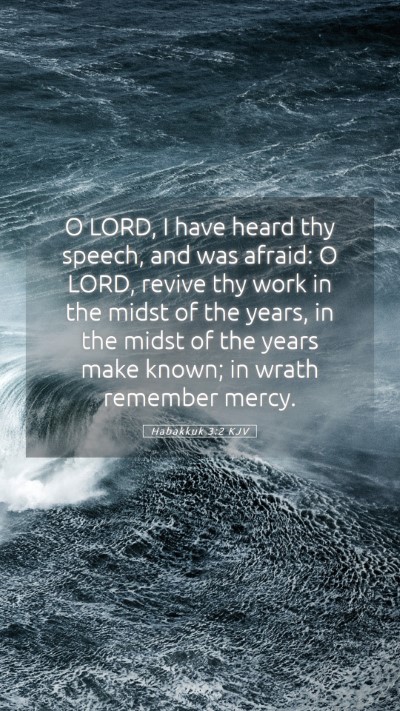Old Testament
Genesis Exodus Leviticus Numbers Deuteronomy Joshua Judges Ruth 1 Samuel 2 Samuel 1 Kings 2 Kings 1 Chronicles 2 Chronicles Ezra Nehemiah Esther Job Psalms Proverbs Ecclesiastes Song of Solomon Isaiah Jeremiah Lamentations Ezekiel Daniel Hosea Joel Amos Obadiah Jonah Micah Nahum Habakkuk Zephaniah Haggai Zechariah MalachiHabakkuk 3:2 Meaning
What is the meaning of Habakkuk 3:2?
O LORD, I have heard thy speech, and was afraid: O LORD, revive thy work in the midst of the years, in the midst of the years make known; in wrath remember mercy.
Habakkuk 3:2 Bible Verse Meaning
Understanding Habakkuk 3:2
The verse Habakkuk 3:2 states:
"O Lord, I have heard the report of you, and your work, O Lord, do I fear. In the midst of the years revive it; in the midst of the years make it known; in wrath remember mercy."
Verse Meaning and Commentary
This verse reflects a profound recognition of God's powerful deeds and a plea for divine intervention amidst judgment. The insights from notable public domain commentaries like those of Matthew Henry, Albert Barnes, and Adam Clarke help to illuminate its significance:
Matthew Henry's Commentary
Recognition of God’s Greatness: Henry emphasizes the acknowledgment of God's greatness, recalling how He has acted in the past. The prophet expresses both reverence and fear for God’s past works, indicating a deep understanding of the seriousness of God's attributes.
Plea for Reviving Mercy: The plea for God to “revive” His work signifies a desire for renewal and restoration. Henry suggests that in times of great need and amidst divine judgment, believers should seek a return of God’s grace.
Albert Barnes' Notes
Context of Judgment: Barnes places this verse in context with Israel’s impending judgment. He interprets the "fear" mentioned in the verse as a reverence that leads to a request for mercy in light of sins and failures. Barnes notes that it is vital for believers to cry out to God, reminding Him of His merciful nature.
Request for Mercy: The phrase “in wrath remember mercy” reflects the combination of justice and mercy inherent in God's character. Barnes highlights that even in judgment, there is hope for mercy, showing the profound depth of God’s compassion towards His people.
Adam Clarke's Commentary
Historical Context: Clarke elaborates on the historical backdrop of Habakkuk, noting that the prophet is wrestling with the issues of justice and suffering in his society. He explains that the request for revival signifies a longing for God’s active presence in a time of calamity.
Divine Intervention: Clarke underscores the importance of 'making it known,' suggesting that the prophet desires the revelation of God’s dealings to be clear to all. This serves as a reminder to Israel of their covenant relationship and the need for their hearts to return to God.
Key Themes
- The Fear of God: An acknowledgment that generates respect for His power and majesty.
- Revival in the Face of Judgment: A cry for spiritual renewal despite impending doom.
- Mercy in Wrath: A plea that highlights God’s nature that balances justice with mercy.
Application of Habakkuk 3:2
This verse offers profound Bible study insights that can be applied in today’s context:
- Understanding God’s Nature: Reflect on how God’s justice and mercy coexist in our lives and society.
- Seeking Spiritual Renewal: In times of trouble, we are invited to seek God for revival, providing comfort and hope.
- Intercessory Prayer: Understanding our role in praying for mercy for ourselves and those around us.
Cross References
- Psalm 85:6 - "Will you not revive us again, that your people may rejoice in you?"
- Micah 7:18 - "Who is a God like you, pardoning iniquity and passing over transgression?"
- James 2:13 - "For judgment is without mercy to one who has shown no mercy. Mercy triumphs over judgment."
Further Study Resources
For deeper exploration, consider using various Bible study tools and resources such as:
- Online Bible study guides: Helpful for collaborative learning.
- Bible study lessons: Structured content for individual or group study.
- In-depth commentaries: For those looking for extensive analysis and historical context.
Conclusion
Habakkuk 3:2 invites believers to approach God with a humble heart, recognizing His past works and asking for revival and mercy in the face of challenges. Understanding this verse deepens our Bible verse understanding and enriches our spiritual journey as we seek to apply these timeless truths to our daily lives.


